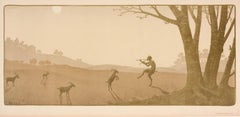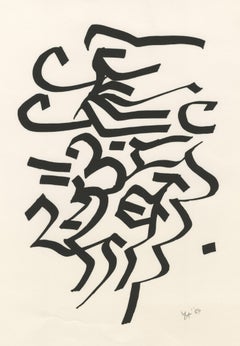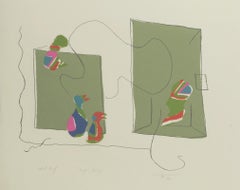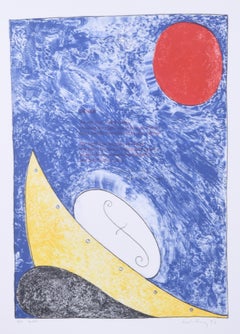Want more images or videos?
Request additional images or videos from the seller
1 of 9
Paul BerthonVision Antique1899
1899
$400List Price
About the Item
- Creator:Paul Berthon (1872-1909, French)
- Creation Year:1899
- Dimensions:Height: 12.875 in (32.71 cm)Width: 25.625 in (65.09 cm)
- Medium:
- Movement & Style:
- Period:
- Condition:Usual aging to the sheet of paper.
- Gallery Location:Fairlawn, OH
- Reference Number:Seller: FA11637.31stDibs: LU14015404542
About the Seller
5.0
Recognized Seller
These prestigious sellers are industry leaders and represent the highest echelon for item quality and design.
Gold Seller
Premium sellers maintaining a 4.3+ rating and 24-hour response times
Established in 1978
1stDibs seller since 2013
835 sales on 1stDibs
Associations
International Fine Print Dealers Association
Authenticity Guarantee
In the unlikely event there’s an issue with an item’s authenticity, contact us within 1 year for a full refund. DetailsMoney-Back Guarantee
If your item is not as described, is damaged in transit, or does not arrive, contact us within 7 days for a full refund. Details24-Hour Cancellation
You have a 24-hour grace period in which to reconsider your purchase, with no questions asked.Vetted Professional Sellers
Our world-class sellers must adhere to strict standards for service and quality, maintaining the integrity of our listings.Price-Match Guarantee
If you find that a seller listed the same item for a lower price elsewhere, we’ll match it.Trusted Global Delivery
Our best-in-class carrier network provides specialized shipping options worldwide, including custom delivery.You May Also Like
The Chap-Book May, 1895
Located in Astoria, NY
William Henry Bradley (American, 1868-1962), The Chap-Book May, Lithographic Poster, 1895, published by Stone and Kimball, signed in plate lower left, black frame. Image: 20" H x 13....
Category
Late 19th Century Art Nouveau Figurative Prints
Materials
Lithograph
Late 19th century color lithograph art nouveau ornate bookplate
By Alphonse Mucha
Located in Milwaukee, WI
"Title Page" and "Art Nouveau Motif" are two sides of one double-sided original lithograph by Art Nouveau master Alphonse Mucha. These illustrations were from "Ilsee, Princess of Tri...
Category
1890s Art Nouveau Portrait Prints
Materials
Lithograph
$8,800
H 17.82 in W 19.69 in
Late 19th century color lithograph art nouveau ornate bookplate figures floral
By Alphonse Mucha
Located in Milwaukee, WI
"Dream Weavers" and "Soul of the Land" are two sides of a double-sided lithograph by Alphonse Mucha. These illustrations were created for "Ilsee, Princess of Tripoli" and are the rare proofs before the text. These artworks were for pages 31 and 32.
8" x 6 1/4" art
19 1/4" x 17 1/8" frame
Alphonse Mucha was born in 1860 in the small town of Ivancice, Monrovia. Though it is rumored that Mucha was drawing before he was walking, his early years were spent as a choirboy and amateur musician. It wasn’t until after he finished high school that he came to realize that living people were responsible for the art that he admired in the local churches. That epiphany made him determined to become a painter. He was soon sent off to Paris, where he studied at the Academie Julian. On January 1, 1985, he presented his own new style to the citizens of Paris. Spurning the bright colors and the more square-like shape of the more popular poster artists, the design was a sensation. Art Nouveau can...
Category
1890s Art Nouveau Figurative Prints
Materials
Lithograph
$4,900
H 19.25 in W 17.125 in
Late 19th century color lithograph art nouveau ornate bookplate floral
By Alphonse Mucha
Located in Milwaukee, WI
"Departing Beauty" and "Dreams" are two sides of one double-sided original lithograph by Art Nouveau master Alphonse Mucha. These illustrations were pages 94 & 93 of "Ilsee, Princess...
Category
1890s Art Nouveau Abstract Prints
Materials
Lithograph
$9,425
H 19.69 in W 17.82 in
'Dancers in Motion', Thai
By Pras Lewchalermwong
Located in Santa Cruz, CA
Signed lower left, 'Pras Lewchalermwong A.P.' (Thai, 20th century) and dated, lower right, November 1976.
Category
1970s Art Nouveau Figurative Prints
Materials
Paper, Screen
Diabelli Variations, Pop Art Violin Screenprint by Arman
By Arman
Located in Long Island City, NY
Artist: Arman, French (1929 - 2005)
Title: Diabelli Variations
Year: 1980
Medium: Serigraph, signed and numbered in pencil
Edition: 150, AP 30
Image Size: 39 x 25.5 inches
Size: 45 ...
Category
1980s Art Nouveau Abstract Prints
Materials
Screen
"Tree of life and Fertility». Limited edition print , Giclee, Floral green
Located in Zofingen, AG
Graceful interweaving of plants with a blur effect in dark green colors
- Limited edition Print - with archival inks on Hahnemühle German etching fine art canvas
- 80x80 cm (31.5 ...
Category
2010s Art Nouveau Abstract Prints
Materials
Canvas, Giclée
$502
H 31.5 in W 31.5 in D 0.04 in
Artist Motivation - Mandela, Former South African President, Inspirational Words
By Nelson Mandela
Located in Knowle Lane, Cranleigh
Nelson Mandela, Artist's Motivation, Signed Limited Edition Lithograph
Many people are unaware that Nelson Mandela turned his hand to art in his 80's as a way of leaving a legacy for his family. He spent time with an art tutor and learnt to draw. In 2002, when creating the The Motivation print, he told Anna and Laura from Belgravia Gallery of his desire to become a full time artist when he retired.
This artwork is a handwritten Artist’s Motivation by Nelson Mandela and reads:
“Today when I look at Robben Island I see it as a celebration of the struggle and a symbol of the finest qualities of the human spirit, rather than as a monument to the brutal tyranny and oppression of apartheid.
Robben Island is a place where courage endured in the face of endless hardship, a place where people kept on believing when it seemed their dreams were hopeless and a place where wisdom and determination overcame fear and human frailty.
It is true that Robben Island was once a place of darkness, but out of that darkness has come a wonderful brightness, a light so powerful that it could not be hidden behind prison walls, held back by prison bars...
Category
Early 2000s Contemporary Abstract Prints
Materials
Lithograph
Nelson MandelaArtist Motivation - Mandela, Former South African President, Inspirational Words, 2002
$10,246
H 19.69 in W 22.05 in D 1.58 in
EARTH - Mandela, Former South African President, Signed Art, Symbol, Crescent
By Nelson Mandela
Located in Knowle Lane, Cranleigh
Nelson Mandela, Earth, Signed Limited Edition Lithograph
Many people are unaware that Nelson Mandela turned his hand to art in his 80's as a way of leaving a legacy for his family. H...
Category
2010s Contemporary Abstract Prints
Materials
Lithograph
$11,590
H 27.56 in W 25.6 in D 1.58 in
untitled
By Richard Hunt
Located in New York, NY
untitled lithograph drawn in 2022 and published in an edition of 43. Measuring 36 by 25 inches, the work is designated number 9 of 43 lower left and signed in pencil "R Hunt...
Category
2010s Abstract Abstract Prints
Materials
Lithograph
More From This Seller
View AllVision Antique
By Paul Berthon
Located in Fairlawn, OH
Vision Antique
Color lithograph, 1899
Signed in the stone upper left (see photo)
Titled in the stone lower right (see photo)
Edition: unsigned edition about 200 (per Arwas)
Published...
Category
1890s Art Nouveau Abstract Prints
Materials
Lithograph
Calligraphy
By Ulfert Wilke
Located in Fairlawn, OH
Calligraphy
Lithograph, 1969
Edition: 260
Signed in script by the artist (see photo)
Signed with initials and dated by the artist (see photo)
Publication for the Print Club of Cleveland, No. 47 for 1969
Printer: Hollander Workshop, New York, with their chopstamp (see photo)
Ulfert Wilke (1907–1987) was an internationally recognized painter, calligrapher and art collector connected to the abstract expressionism movement. He was born in Bavaria, Germany, and immigrated to the United States in 1938. He is best known for his large canvas paintings and highly detailed lithographs that were inspired by calligraphic writing. Wilke was deeply intrigued by the written language, and much of his work was derived from his abstract interpretation of the shapes, colors and meanings of writing that he found in all languages and forms, including the poetry and ancient engravings...
Category
1960s Abstract Abstract Prints
Materials
Lithograph
Things Kept
Located in Fairlawn, OH
Things Kept
Color lithograph, 1970
Signed & titled in pencil (see photos)
Annotated: "Artists Proof"
Printed on RIVES wove paper
Condition: Excellent
Sheet has aging consistent with ...
Category
1970s American Modern Abstract Prints
Materials
Lithograph
Deneb
By William T. Wiley
Located in Fairlawn, OH
Deneb
Color lithograph on BFK Rives, 1996
Signed and dated in pencil lower right
Titled and inscribed "Ed 265" lower left
Publishers chop stamp l;ower left
Printed by Shark's Ink,
...
Category
1990s Contemporary Abstract Prints
Materials
Lithograph
Summer in Venice
By Adja Yunkers
Located in Fairlawn, OH
Summer in Venice
Lithograph printed in colors from five stones on Italian "Pascia" paper, 1966
Signed and dated lower left in pencil (see photo)
The Print Club of Cleveland Publicati...
Category
1960s Abstract Abstract Prints
Materials
Lithograph
Red Mountain
By Louisa Chase
Located in Fairlawn, OH
Red Mountain
Three color lithograph, 1986-7
Signed, titled and dated in pencil lower right
Annotated "B.A.T." for Bon a Tire lower left corner
This example is the printers guide for ...
Category
1980s Abstract Expressionist Abstract Prints
Materials
Lithograph
Still Thinking About These?
All Recently ViewedMore Ways To Browse
Robert Rauschenberg Exhibition Poster
Sharon Sutton
Sol Lewitt Lines
Sonja Henie
Vasarely Zebra
Victor Vega
Vintage Changing Screen
1960s Psychedelic Poster
Alberto Bianchi
Alfons Borrell
American Trotting Horses
Basquiat Album
Basquiat Anatomy
Ben Mahmoud
Benedictus Pochoir
Bmw Art Car
Brian Eno Art
Brigitte Coudrain



